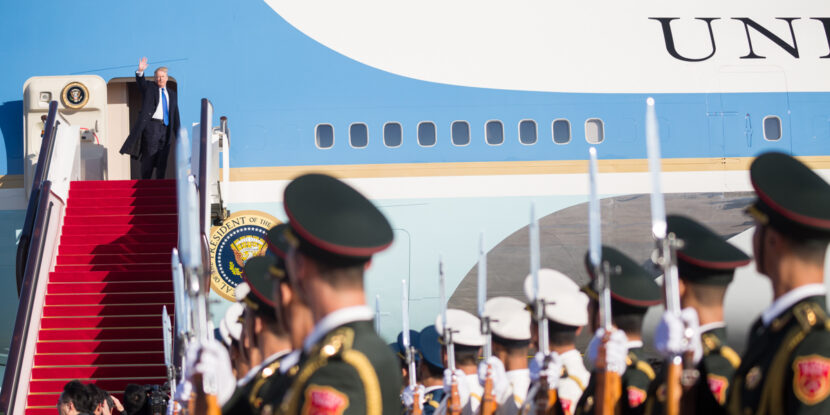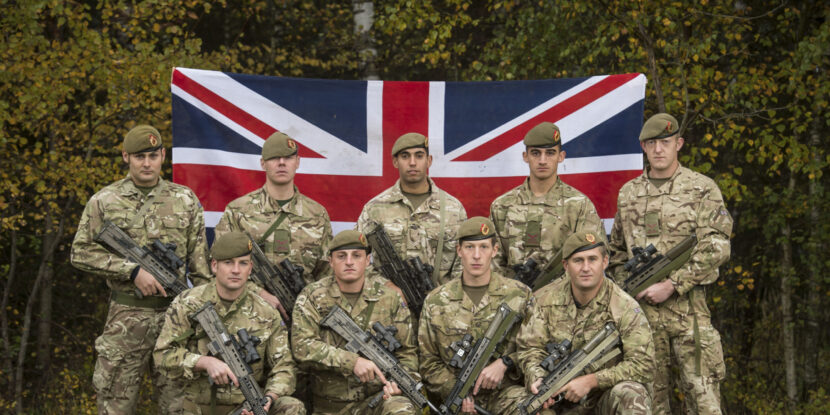
PULSE POINTS:
❓What Happened: President Donald J. Trump announced he will not further reduce tariffs on China to encourage negotiations.
👥 Who’s Involved: President Trump, NBC’s Kristen Welker, and the Chinese Communist Party (CCP).
Your free, daily feed from The National Pulse.
📍 Where & When: Mar-a-Lago estate, during an NBC Meet The Press interview recorded Friday.
💬 Key Quote: “I’m not looking to have China make hundreds of billions of dollars and build more ships and more army tanks and more airplanes.” – President Trump.
⚠️ Impact: Potential economic strain on China and long-term U.S. economic strategy with expected new investments.
IN FULL:
President Donald J. Trump has stated that he will maintain tariffs on Chinese imports, resisting any reduction to bring Beijing to the negotiating table. In an interview with NBC’s Meet The Press recorded at his Mar-a-Lago estate, Trump emphasized that China’s economy is suffering significantly. “They’re getting absolutely destroyed. Their factories are closing. Their unemployment is going through the roof,” Trump remarked to host Kristen Welker.
Trump made it clear that he does not intend to ease the tariffs, which are designed to protect American producers from cheap Chinese imports, merely to initiate talks. When asked directly by Welker if he would drop the tariffs for negotiation purposes, Trump responded with a definitive “No.”
The Chinese Communist Party (CCP) has indicated an openness to discussions on tariff reductions, but their own tariffs are far less effective than President Trump’s, as they export far more to the U.S. than vice versa. The Trump administration takes the view that this status quo results from various informal restrictions on American exports, and underhanded tactics such as state subsidies and currency manipulation artificially increasing Chinese goods’ competitiveness in price.
Trump suggested that while future reductions may occur, they are contingent on ensuring the U.S. can conduct business effectively with China. “At some point, I’m going to lower them because otherwise you could never do business with them,” he stated.
The America First leader stressed the benefits of tariffs to industries such as the automotive sector. He highlighted significant investments by companies like Apple, Toyota, and General Motors, which are committing billions to U.S. operations.
Beijing has already created a list of American products, including pharmaceuticals and microchips, exempt from its retaliatory tariffs. Similarly, the Trump administration has temporarily exempted certain Chinese products, such as smartphones, laptops, and computer parts, from tariffs to give consumers and the domestic industry time to adjust.

PULSE POINTS:
❓What Happened: Nearly half of Britons surveyed say they would refuse to fight for their country “under any circumstances.”
👥 Who’s Involved: Ipsos survey respondents, Richard Gill, a former British Army officer.
Your free, daily feed from The National Pulse.
📍 Where & When: United Kingdom, ahead of Victory in Europe (VE) Day commemorations on May 5.
💬 Key Quote: “We’ve stopped teaching pride in our country, its history, and its values… A nation unsure of itself cannot expect its people to defend it. That must change.” — Richard Gill.
⚠️ Impact: The findings highlight a decline in patriotic sentiment, with significant gender and political divides.
IN FULL:
A recent Ipsos survey reveals a significant decline in patriotic sentiment among Britons, with nearly half of those surveyed expressing an unwillingness to fight for their country “under any circumstances.”
The survey, which queried over 1,000 adults, found that only 35 percent of respondents would be willing to take up arms in a time of war, while a notable 48 percent stated there were no conditions under which they would go to war for Britain. An additional 17 percent said they were unsure of their stance.
The survey results emerge as the United Kingdom prepares for Victory in Europe Day (VE Day) commemorations, marking 80 years since the end of the Second World War, with celebrations including a military procession through central London on May 5.
Richard Gill, a former British Army officer with service in Iraq and Afghanistan, commented on the survey’s implications, suggesting a “deeper national malaise” as the root cause. He warned, “We’ve stopped teaching pride in our country, its history, and its values. A nation unsure of itself cannot expect its people to defend it. That must change.”
The survey also uncovered notable gender and age disparities. While nearly half of the men surveyed (49 percent) expressed a willingness to fight, only 21 percent of women shared the same sentiment. Among younger respondents aged 18 to 34, 42 percent indicated they would volunteer, whereas willingness significantly decreased to 28 percent among those aged 35 to 54, with over half of this group asserting they would never take up arms.
Political affiliations also played a role in respondents’ willingness to fight. Supporters of Nigel Farage’s Reform Party were the most inclined to defend their country—despite the establishment media and political parties attempting to paint them as Russian stooges—contrasting sharply with supporters of the fanatically pro-European Union (EU) Liberal Democrats, who were the least likely to do so.
Mass migration has also likely been a contributing factor in the strength of feeling towards the nation, with many first and second generation migrants more likely to fight for the nation from which they came, rather than the one in which they reside.
show less

 1 month ago
10
1 month ago
10








 English (US) ·
English (US) ·